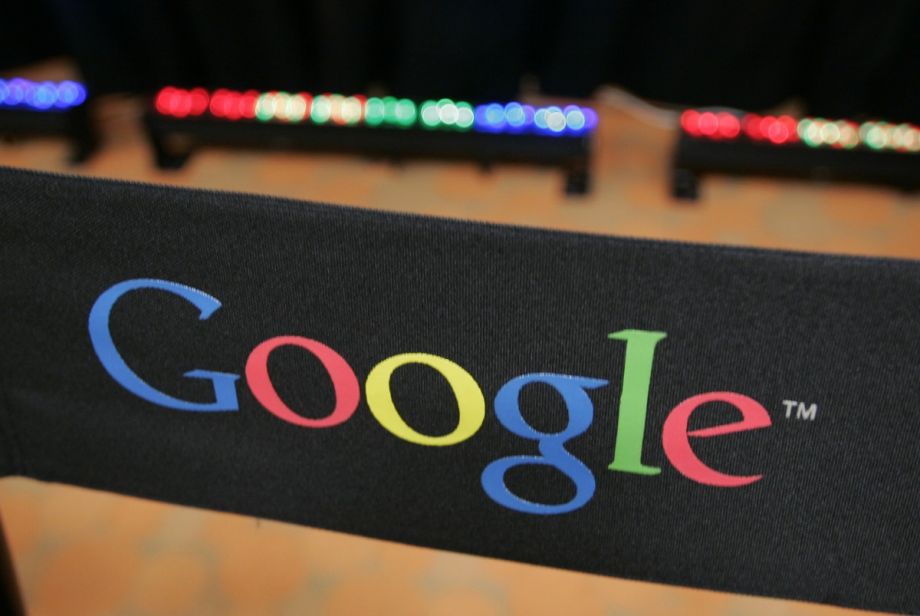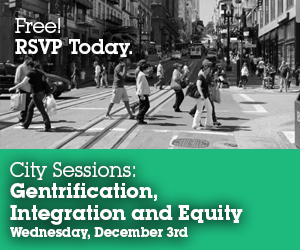Inspiring Better Cities.
New Google Fiber Expansion Ups Kansas City’s Tech Rep
 (AP Photo/Paul Sakuma, File)
(AP Photo/Paul Sakuma, File)
Kansas City was the first place in America to get Google Fiber,
symmetrical gigabit Internet access (meaning uploads are as fast as
downloads). For comparison, if you’re getting 50 Mbps (typical of many
Verizon FiOS plans), your Internet speed is about 5 percent as fast.
Now, Google has announced that it will roll out a new service, Google Fiber for Small Business, in parts of Kansas City, Kansas and Kansas City, Missouri. Google’s already showing off the expansion at a local Starbucks. As Internet speeds become an increasingly prominent policy issue in cities, Kansas City’s taking its distinct advantage and running with it.
Until now, Google has kept the service out of commercial areas. One business owner, Teri Rogers of Hint, a video production company, says that she has staff who sometimes work from home so they can quickly upload and download the massive video files they work with. The new service will also offers static IPs, which is helpful for companies that want to be able to use local data remotely.
Brian Jones, founder of Graphicmachine, a digital agency, called the latest news from Google “a vote of confidence in a place that has weathered a decaying urban core and worked to bring that back. It’s a sign of the future that’s ahead for this place as the technology ideas that can come from here don’t have to find a home somewhere else to flourish.”
When Google first rolled out fiber access in a residential neighborhood near State Line Road, which splits the city between Missouri and Kansas, a handful of entrepreneurs had already decided to set up there to begin building a startup ecosystem.
Toby Rush, CEO of EyeVerify, one of the original KC Startup Village companies, says the early pioneers there understood that serendipitous interaction could be powerful for their ventures. Bumping into other technologists can yield everything from encouragement to business partnerships, he notes. “It’s really easy for those conversations to be had when you have proximity,” says Rush.
Rush values serendipitous interaction so much that he has hesitated to hire remote workers. The company has grown enough to move to a new space downtown, but with Google’s business gigabit speeds in that office, he says, he may be willing to hire people working from other cities.
Beyond making the tech sector happy, the Google Fiber connection gives Kansas City a reputation for forward thinking. In May, Cisco announced it would integrate its Smart+Connected technology along the two-mile streetcar line that the city’s building. It’s installing sensors, kiosks, video and smart lighting. Both Rush and Ryan Weber, of KC Next, the region’s tech council, point to the nod from Google as making the city more attractive for a demonstration like Cisco’s.
For big companies that are already in Kansas City, Weber says, like Sprint and Garmin, Google Fiber in residential areas helps to make it more attractive for the sort of tech talent they want to recruit.
More broadly, people I spoke to in Kansas City believe that Google has put momentum on the flywheel, as Rush put it, for other cities to improve connectivity. In fact, New York City just announced its plans for a free gigabit (if somewhat big brothery) public Wi-Fi plan. Within the Kansas City area, Consolidated Communications announced a service this week that mirrors Google Fiber (symmetrical, 1GB connections) — at a price, $69.95 per month, that’s one nickel below what Google charges for its basic connection. Odds are, more companies enabling consumers to get more done online is exactly what Google wants.
Brian Jones, who relocated his Graphicmachine from NYC to Kansas City around the time that Google was asking cities to pitch them on bringing Fiber, says, “After living in NYC for 13 years, Kansas City is the kind of place that you get to participate in at whatever level you want. The part that Google Fiber adds to that equation is that the things that you build can take this place’s positive energy and add it to the larger technological conversation that is happening.”
Until now, Google has kept the service out of commercial areas. One business owner, Teri Rogers of Hint, a video production company, says that she has staff who sometimes work from home so they can quickly upload and download the massive video files they work with. The new service will also offers static IPs, which is helpful for companies that want to be able to use local data remotely.
Brian Jones, founder of Graphicmachine, a digital agency, called the latest news from Google “a vote of confidence in a place that has weathered a decaying urban core and worked to bring that back. It’s a sign of the future that’s ahead for this place as the technology ideas that can come from here don’t have to find a home somewhere else to flourish.”
When Google first rolled out fiber access in a residential neighborhood near State Line Road, which splits the city between Missouri and Kansas, a handful of entrepreneurs had already decided to set up there to begin building a startup ecosystem.
Toby Rush, CEO of EyeVerify, one of the original KC Startup Village companies, says the early pioneers there understood that serendipitous interaction could be powerful for their ventures. Bumping into other technologists can yield everything from encouragement to business partnerships, he notes. “It’s really easy for those conversations to be had when you have proximity,” says Rush.
Rush values serendipitous interaction so much that he has hesitated to hire remote workers. The company has grown enough to move to a new space downtown, but with Google’s business gigabit speeds in that office, he says, he may be willing to hire people working from other cities.
Beyond making the tech sector happy, the Google Fiber connection gives Kansas City a reputation for forward thinking. In May, Cisco announced it would integrate its Smart+Connected technology along the two-mile streetcar line that the city’s building. It’s installing sensors, kiosks, video and smart lighting. Both Rush and Ryan Weber, of KC Next, the region’s tech council, point to the nod from Google as making the city more attractive for a demonstration like Cisco’s.
For big companies that are already in Kansas City, Weber says, like Sprint and Garmin, Google Fiber in residential areas helps to make it more attractive for the sort of tech talent they want to recruit.
More broadly, people I spoke to in Kansas City believe that Google has put momentum on the flywheel, as Rush put it, for other cities to improve connectivity. In fact, New York City just announced its plans for a free gigabit (if somewhat big brothery) public Wi-Fi plan. Within the Kansas City area, Consolidated Communications announced a service this week that mirrors Google Fiber (symmetrical, 1GB connections) — at a price, $69.95 per month, that’s one nickel below what Google charges for its basic connection. Odds are, more companies enabling consumers to get more done online is exactly what Google wants.
Brian Jones, who relocated his Graphicmachine from NYC to Kansas City around the time that Google was asking cities to pitch them on bringing Fiber, says, “After living in NYC for 13 years, Kansas City is the kind of place that you get to participate in at whatever level you want. The part that Google Fiber adds to that equation is that the things that you build can take this place’s positive energy and add it to the larger technological conversation that is happening.”
Brady Dale is a writer and comedian based in Brooklyn. His reporting on technology appears regularly on Fortune and Technical.ly Brooklyn.
Follow @BradyDale
Follow @BradyDale

No comments:
Post a Comment
Please leave a comment-- or suggestions, particularly of topics and places you'd like to see covered